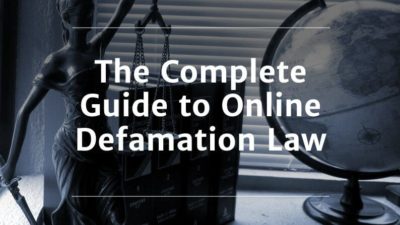
WebActivism.com Post Removal
This page has been peer-reviewed, fact-checked, and edited by qualified attorneys to ensure substantive accuracy and coverage.
In this all-encompassing blog post, we’re going to take you through what WebActivism.com is, several ways to remove posts and libel from scam and fraud reporting websites, and how online activism and consumer advocacy websites can pose a serious threat to your personal and professional reputation.
1. To remove false and defamatory posts from WebActivism.com, we strongly recommend you first consult an experienced internet defamation removal attorney. WebActivism is a user-generated content platform and website and thus, protected under Section 230 of the CDA, meaning, unless WebActivism specifically creates, edits, or curates the content, they cannot be held liable for the content posted. Furthermore, they likely won’t remove libelous and false content if asked.
2. Fraud reporting and consumer advocacy websites are legal, and protected under Section 230 of the CDA, unless one of the following exceptions applies:
- Intellectual property infringement and claims,
- Materially edited and altered content by the website,
- Criminal law violations,
- Promissory estoppel, and
- Encouragement to post illegal content.
3. Some consequences of online defamation and libel include:
- Loss of loyal customers and overall business,
- Severance of partnerships,
- Loss of sponsorships, advertising, and other funding
- Increased community and media criticism and comment,
- Embarrassment
- Denial of future business partnerships and opportunities,
- Loss of future employment or promotion opportunities, and
- Having to close your business for good.
Online Defamation Removal Fact: Most U.S. states recognize the legal principle of ‘defamation per se’, which recognizes generally four categories of statements as so inherently defamatory, that a plaintiff need not prove they suffered damage as a result of the statement in question. Specifically, defamation per se usually includes: statements imputing a loathsome or contagious disease on the plaintiff, statements alleging the plaintiff committed a crime, statements imputing unchastity on the plaintiff, and statements which harm or injure a person in their trade, profession, or business.
If you’ve been the victim of false and defamatory posts on WebActivism.com or other fraud/scam reporting websites, reach out to the defamation removal lawyers of Minc Law ASAP!
At Minc Law, we will do everything in our power to secure a swift and effective removal from such sites. In our tenure as nationally recognized defamation removal attorneys, we’ve secured the removal and takedown of over 25,000 pieces of content, litigated in over 22 states and 3 countries, and worked with 1300+ clients (read up on what they have to say about us at our testimonials page). Furthermore, we’ve worked tirelessly with numerous website administrators, content managers, and third-party arbitration firms to secure the timely, permanent and guaranteed removal, so rest assured you’re in good hands.
To learn more about our Guaranteed Removal Services and how we are able to guarantee content to be removed from a number of sites, we recommend checking out the video below. In the video, our Intake & Paralegal Manager, Darcy Buxton, goes over what Guaranteed Removal Services are, typical factors that influence costs, as well as the answers to frequently asked questions by our clients.
Video: What Are Minc Law’s Guaranteed Removal Services?

Contact us today to schedule your free, initial no-obligation defamation consultation with an intake specialist by calling us at (216) 373-7706, or by filling out our contact form online.
We’re here to fight for your reputation.
The Brass Tacks: What is WebActivism.com?
WebActivism.com is a popular website for persons to “raise their voices against injustice,” by exposing scams, frauds, and unethical business practices and providing a platform for persons looking to take up a “social or political cause” to “question the big guns.” Specifically, their ‘What we do’ section states:
“We protect your right to free speech, and give you a platform to voice your opinion and fight the bad guys without worrying about finances, security, confidentiality, legal hassles, technical capabilities, resources or information.”
Furthermore, they tout themselves as a platform for persons to highlight important issues without fear of retribution. And, that’s not all. They also will arrange the set up of a fully functional website with a free domain name, hosting, design, and legal and technical support for whichever campaign a person is looking to advocate for – all costs covered through donations received from volunteers and supporters.
WebActivism’s website boasts several categories of articles, alerts, and reports, including: opinion, featured, scam, investigation, policy, business, and society.
Finally, while WebActivism does serve as a legitimate website for combating fraud, scams, and other predatory practices out there, there is a possibility for libel and online defamation to slip through its cracks.
Now, let’s tackle why scam and fraud reporting websites like WebActivism and Scamity.com can pose a serious threat to your reputation and livelihood.
Why Scam & Fraud Reporting Websites Pose a Threat to Your Reputation
Websites which provide platforms and forums for users to post reviews and accusations of fraud and scams have unfortunately evolved into hotbeds of online defamation in libel. While most started with noble intentions, and with the intent to increase transparency and protect consumers/everyday persons, they’ve morphed into an unverified and anonymous venue for persons to lodge unfounded accusations and attacks (note that not every user-generated content platform for scam and fraud reporting embodies this).
Below are just three of the many reasons why many scam and fraud reporting websites have become such hotbeds for libel and false attacks.
Defamation Law Fact: A SLAPP lawsuit – also known as a ‘strategic lawsuit against public participation – is a type of lawsuit filed by one person or entity in order to intimidate, censor, or otherwise burden the opposing party. SLAPP lawsuits are generally considered frivolous, and you should look to see whether your state has any Anti-SLAPP legislation in place to curb these sorts of lawsuits. They are generally filed against a party who is attempting to legally exercise their rights of free speech under the Constitution’s First Amendment.
1. Anonymity & Unverified Users
User-generated content platforms for fraud and scam reporting often support lackluster registration and verification procedures, making them a go-to platform for persons looking to remain anonymous. In the wild world of online defamation, anonymous users are more likely to post defamatory and libelous content, as they know the legal repercussions and remedies against them are likely minimal. Most users are not going to take the proper time to identify a person online or consult an experienced online defamation removal attorney. Furthermore, even should a person employ an experienced defamation attorney, it still is an arduous process to uncover a person’s personal information and identity.
Along with anonymity and unverified users comes a high susceptibility to libel and defamation, something we will address in our next bulleted section.
On WebActivism.com, users looking to post about and expose persons or businesses are prompted with an “Add Your Post” section, where they only have to fill out their name, email address, captcha and submission. They are also presented with an option to “Post Anonymously,” meaning the general public won’t be able to see any personal details about the author.
Furthermore, when it comes to providing users with a fully functioning website to advance whichever cause or campaign they choose, WebActivism notes: “We provide free offshore domain registrations in multiple European and Asian countries. Our Offshore Domain Trust is currently resident in these selected privacy-friendly nations which provide you with more private location options for your whois data…No one can simply subpoena and get your details.”
While WebActivism does have users seeking noble causes, there is potential for persons to utilize their platform and free anonymous domain services to further a malicious agenda. And, should someone choose to do that, legal recourse could be extremely difficult, due to the jurisdictional safe-havens and privacy afforded to its users.
2. High Susceptibility to Defamation & Libel
As we mentioned above, along with anonymous users, comes a higher possibility of online defamation and libel. After all, why wouldn’t a person feel more comfortable posting false facts and accusations if they know there’s no way for it to be verified? Or, why wouldn’t they post such things if they knew the legal recourse against them was a difficult landscape to navigate?
Additionally, most platforms and websites for scam, fraud, and other abuse reporting, do nothing to verify the actual content posted, as they recognize their near-blanket immunity granted to them under Section 230 of the Communications Decency Act (we will address this below). If a website has not authored or curated the content in question, then they often have no duty to remove it.
Anonymous posters, combined with a self-aware and hands-off TOS, make for a deadly combination when it comes to online defamation and libel. Finally, most of these platforms and websites do not have a button or function to report libelous or otherwise illegal post, so there’s a high likelihood false attacks and accusations may never be reported or removed, or they may be found too late.
If you’re unsure about how to combat online defamation and libel, it’s recommended you consult an experienced (and nationally recognized) defamation removal attorney ASAP. At Minc Law, we’ve identified and removed over 25,000 pieces of online content and libel, so rest assured you’re in good hands.
We’re here to help you hold the malicious poster or commenter in question liable!
3. Unclear & Strict Content Removal Policies
For most users who have been defamed or libeled on a user-generated content platform for scam and fraud reporting, they often don’t know where to start when it comes to confronting and disputing false reviews/posts. User-generated content platforms and consumer advocacy websites are protected under an overarching piece of Internet legislation, known as the Communications Decency Act (CDA). Specifically, Section 230 of the CDA protects websites and Internet Service Providers (ISPs) from defamation and other liability for content created and posted by third-parties.
Video: Why Section 230 of the CDA Should Matter to You

Most platforms recognize their near blanket immunity granted under Section 230 of the CDA, and acknowledge such in their ‘terms of services’ and ‘privacy policies’, making it an uphill battle for users looking to remove unsavory and false content. Most sites view themselves as a permanent and complete record of a product, business, or person’s history.
Defamation Law Fact: In the U.S., it can sometimes be difficult to get a straight answer about what constitutes libel or slander, as most states differ in their definitions of both. And, some states have criminal libel and defamation laws in their books, making it for a tricky landscape to navigate. At its simplest, libel is a written or published false statement about a person, while slander is a spoken false statement.
Let’s put an end to the online abuse and attacks now!
Contact us to schedule your free, initial no-obligation consultation with an intake specialist by calling us at (216) 373-7706 or by filling out our contact form online. What are you waiting for?
Remember, online defamation and libel is like a wildfire, the longer you let it sit and spread, the more damage it’s going to do. And, it stands to reach a point where the effects could be near-irreversible.
If you or your business has been posted to WebActivism, there is also a likelihood that your Google My Business profile has been defamed as well. For further reading, we recommend checking out our comprehensive blog post explaining how to remove Google reviews.
The Effects of Defamatory & False Posts on Your Business
If you’re a business or company, online defamation and libel (false posts and accusations) can carry grave consequences for your future. Let’s first take a look at some statistics before getting into the numerous consequences and effects of online libel.
According to a 2017 study – a professional SEO and digital marketing software company – 97% of consumers searched online for local businesses in 2017, with over 12% of them searching online every single day. That’s a pretty high number, isn’t it? And, it’s not just the percentage of persons searching for local businesses and companies online that is worth noting, over 85% of consumers who read online reviews stated they trusted them as much as a personal recommendation.
Additionally, 49% of consumers noted they need a business or company to carry at least a 4-star rating before they choose or employ it, so a fake or false review/post stands to severely impact your overall business and bottom-line.
This especially rings true if your business or company is a startup, as it’s estimated nearly 42% of all startup businesses fail – so, there’s no room for error. Don’t let others dictate your business or company’s future!
Mix in the fact that users and consumers just aren’t that great at spotting fake reviews (84% acknowledged they can’t always spot them), and you and your business could be in trouble.
Now, let’s turn to several of the largest consequences businesses and companies can face if they are defamed and otherwise falsely posted about on fraud and scam reporting websites:
- Loss of loyal customers and overall business,
- Severance of partnerships,
- Loss of funding, advertising, or sponsorships,
- Heightened community and media criticism and comment,
- Unwanted attention,
- Denial of future business partnerships and opportunities,
- Denial of future employment or promotion opportunities, and
- Having to shut down ones business or company for good.
Online Defamation Fact: Consumers – on average – read 7 reviews about a company, product, or service before trusting them (an increase from 6 in 2016). This means businesses, restaurants, and companies need to stay on top of their online presence. We suggest establishing a brand reputation and monitoring budget, to respond to negative online reviews, combat false posts and content, and identify intellectual property infringers.
If you or your business has been the victim of false posts and malicious attacks on WebActivism or another consumer advocacy/scam reporting website, contact the defamation removal lawyers of Minc Law now!
We know defamation law, so rest assured you’re in good hands. Reach out today to schedule your free, initial no-obligation consultation with an intake specialist by calling us at (216) 373-7706 or by filling out our contact form online.
Can I Hold WebActivism.com Liable For Defamatory & False Posts?
Simply put, probably not.
As we noted above, user-generated content platforms and other ISPs which derive the bulk of their content from third-parties, are not likely liable for the defamation or libel posted to their site. Section 230 of the Communications Decency Act is a comprehensive clause which reads:
“No provider or user of an interactive computer service shall be treated as the publisher or speaker of any information provided by another information content provider.”
In basic terms, as long as the website isn’t the one who creates, edits, or curates the content posted, then they likely will not be held liable for defamation. There are several important exceptions to note, including: copyright infringement, criminal activity, promissory estoppel, and intellectual property infringement.
Section 230 of the CDA has created great divided amongst academics and persons alike, and has been labeled by some as “one of legislative action and inaction, justice and injustice, and the weighing of priorities and values.” On one hand, Section 230 does promote the free spread of information and ideas. On the other, it has created a thriving ecosystem for online defamation, sex trafficking, pornography, child sex-abuse images, and exploitation. “It is clear that, whatever Section 230 did for the legitimate digital economy, it also did for the illicit digital economy.”
Note that in regards to revenge porn – also known as distribution of intimate images without consent – it has become well protected in the U.S., so there shouldn’t be much of an issue removing it. You can read up further about revenge porn laws in the United States by checking out our all-encompassing guide, How to “Permanently Remove Posts From Revenge Porn Websites“, or its video version below.
Video: What to Do If Someone is Sharing Your Intimate Images Without Consent

Your best bet for holding someone accountable for malicious and false online posts on a fraud or scam reporting website is by going after the individual poster themselves. However, this can be relatively difficult, especially as it may require the issuance of subpoena. We recommend consulting an experienced internet defamation attorney if you have any questions about holding an individual poster liable for libel and false posts.
U.S. Defamation Law Fact: Regardless of legislation or case law, all states recognize some form of “privilege,” which will immunize speakers and publishers of libel and slander. Such privileges generally include: absolute privilege, qualified privilege, statutory privilege, and fair report privilege. Think of privilege as meaning a person’s “legal right or entitlement” to communicate or publish a statement at a certain time (and to a certain audience).
It’s also important to understand that if your business’s financial or proprietary rights have been harmed or affected as a result of a false statement, then you may have a legal claim against an individual for business or commercial disparagement. What separates business/commercial disparagement from online defamation is that instead of damage to a person or business’s reputation, there is damage to a business’s proprietary and financial rights.
You can read up further about commercial/business disparagement by checking out our detailed blog post, “What is Business Disparagement?”.
Contact an Experienced Defamation Removal Lawyer Today!
If you or your business has been the victim of false attacks and posts on WebActivism.com, or other scam and fraud reporting websites, contact the defamation removal lawyers of Minc Law immediately! At Minc Law, we know the ins and outs of U.S. defamation law, and have litigated in over 22 states and 3 countries in our storied tenure.
Furthermore, we’ve removed over 25,000 pieces of negative, defamatory, and unwanted content/web pages, and worked with 1300+ clients. And, that’s not all. We boast a nearly 100% online defamation removal rate – all for a flat, reasonable fee.
The online abuse stops now!
Here’s what you can expect when working with the nationally recognized attorneys of Minc Law:
- Constant Communication & Open Dialogue: Some defamation removal attorneys and agencies go missing after the defamation removal process has commenced, not us. We understand just how stressful and overwhelming libel and defamation can be, so always know that we’re here to keep you informed. Know that your goals are our goals!
- Respect & Courtesy: We treat all clients with the utmost respect and courtesy, and aren’t happy unless you’re happy.
- We Have Proven Results: Websites and businesses respond to Minc Law, and it shows. As noted above, we’ve secured the removal of over 25,000 pieces of online content, and boast a nearly 100% online defamation takedown rate, so rest assured you’re in good hands.
Contact us today to schedule your free, initial no-obligation consultation with an intake specialist by calling us at (216) 373-7706 or by scheduling a meeting by filling out our online contact form.



